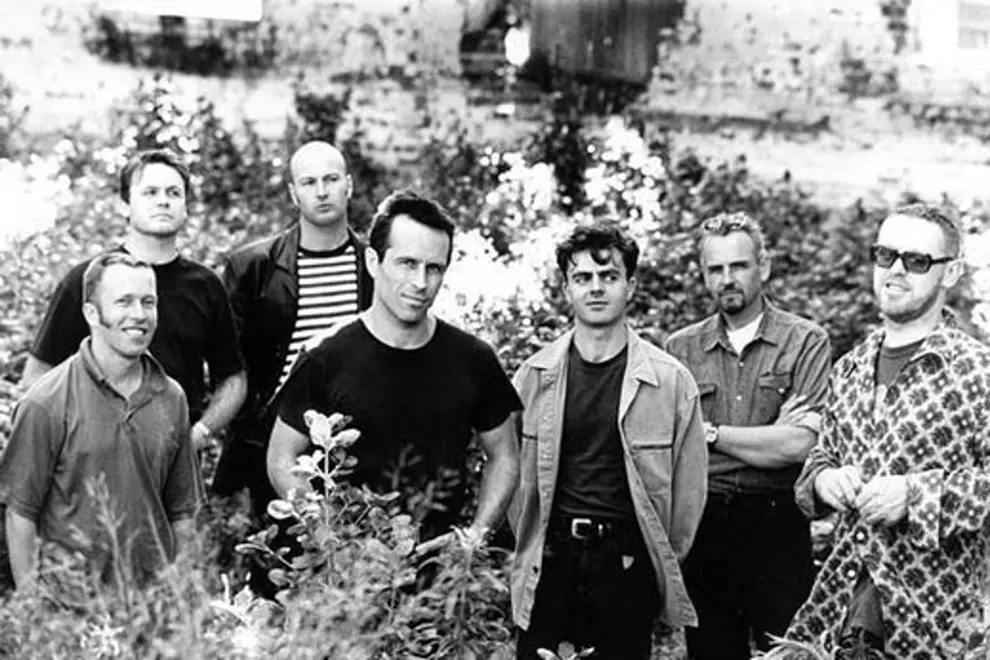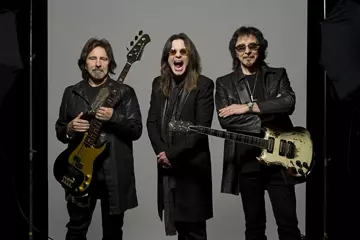It is, as Mark Seymour sings, “a short song, but it’s a hell of a story”.
Having an iconic song, one that becomes part of the culture, is the holy grail for any artist. Russell Morris has The Real Thing, Ross Wilson has Eagle Rock, and Daryl Braithwaite has The Horses. And sometimes, a song ends up in unintended places, surprising the songwriter.
Thirty years ago this week, Hunters & Collectors’ Holy Grail hit its peak on the national ARIA charts – #20. It spent two weeks at that spot and 12 weeks in the Top 40. Nothing remarkable, really, though it was the band’s second-highest charting single (behind True Tears of Joy, which reached #14 at the start of 1993).
It’s a tale of triumph amidst adversity as the much-loved Australian band was making their seventh studio album, Cut, with American producer Don Gehman.
“He was basically deconstructing the band’s songwriting process and looking for hits,” Seymour recalls. “It wasn’t a happy time for us. The band almost broke up over that – there was so much internal tension.”
At the time, Seymour was reading The Passion, the 1987 novel by English writer Jeanette Winterson about Napoleon’s chef, Henri. “It’s a story about survival. The army is obliterated by ice and snow, and this little chef basically deserts and goes to live in Italy. It’s a really powerful book, and somehow I drew this analogy between this guy managing to survive this incredible ordeal and Hunters & Collectors making this excruciating record. I wanted to write a song to serve up this idea that regardless of what happens, you’ve got to stay true to the quest.”
You play, you win, you play, you lose. You play. It’s the playing that’s irresistible. – The Passion
Don't miss a beat with our FREE daily newsletter
Gehman introduced loops and samples to Hunters & Collectors, a move that didn’t sit well with all the band members. “It changed the band dynamic completely,” trumpet player Jack Howard recalls.
In the studio, Seymour says Gehman played “divide and conquer” while the producer, for his part, labelled the band “a bunch of communists”.
Seymour admits he was paranoid and sleepless, knowing the album lacked the “key” track.
Although wherever you are going is always in front of you, there is no such thing as a straight ahead. – The Passion.
Then, Seymour “woke up this morning from the strangest dream”.
“It was the gospel truth,” he wrote in his memoir, Thirteen Tonne Theory. “I’d really had one, and though it was coloured by the pressing need to relieve my bladder, the fact remained: I’d woken up somewhere inside Jeanette’s book.” In his dream, Seymour saw his bandmates dressed as Napoleon’s Old Guard, falling by the roadside, twitching and gangrenous.
Seymour was confident he’d crafted a hit. But he remembers the tension in the studio. “One of the guys – and I won’t mention his name – didn’t want Holy Grail on the record, and we had a big argument,” he tells The Music. “It was typical of Hunters & Collectors – there was always some bloke in the peanut gallery going ‘Nuh!’”
Whoever it is you fall in love with for the first time, not just love but be in love with, is the one who will always make you angry, the one you can’t be logical about. – The Passion
Howard remembers much angst about Holy Grail’s main guitar riff: “Was there a way to modify it slightly, to twist it around a bit? It just sounded a bit generic. Once we’d put the arrangement around it, it felt a lot better. The horn lines sound quite composed and arranged, but they were really just the first ideas that popped into my head.”
Some band members thought – derisively – that the song sounded like Boston’s More Than A Feeling.
Seymour acknowledges that the naysayers in the band were often right. “But on this occasion, I was absolutely, fiercely determined because I just felt that the lyric would drive the song, and that’s pretty much what happened. That song has been embraced by Australians because they really connect with the words. It’s a very passionate, simple story.”
Do it from the heart or not at all – The Passion.
Seymour knew that Holy Grail was the album’s “key” track. But clearly, not everyone agreed. Inexplicably, it was the fourth single released from Cut, following Head Above Water, We The People and True Tears of Joy. “There seemed to be this carefully orchestrated strategy underway,” Seymour recalls. “I’m still mystified.”
In 2002, when Channel 10 shared the AFL rights with Channel Nine, they started using Holy Grail to promote their football coverage. Hunters & Collectors ended up performing the song at the 2013 AFL Grand Final – 15 years after they broke up (after Seymour had done the song solo at three Grand Finals, in 1998, 2002 and 2009).
“As a diehard Aussie Rules fanatic, it was very special,” Howard says. “I made sure that I gave myself time to soak it all in. Shame it was Hawthorn versus Fremantle.”
Howard also fondly recalls performing Holy Grail at a Grand Final Eve lunch for his beloved Carlton. Afterwards, Blues legend Stephen Kernahan remarked, in his sonorous voice: “That was awesome.” It illustrated how the song had crossed cultural boundaries. “One of the highlights of my career,” Howard smiles.
Howard occasionally performs Holy Grail as part of his Epic Brass show, where he and guest singers perform classic Australian songs with a brass section. “Holy Grail is always a sure-fire winner live,” he says. “It’s become one of those universal sing-a-longs.”
Howard also did a stunning version with the Melbourne Indie Voices choir.
Asked for the secret of the song’s success, Howard reflects: “Who knows what transforms a song from just a song into something more? Simplicity of form, great hooks – the piano riff, the bass part in the verse, the horn lines – and a well-told tale.”
In 2013, The Rubens covered Holy Grail on the Hunters & Collectors tribute album, Crucible. “At first, we were absolutely over the moon to hear that we could record Holy Grail,” the band’s singer Sam Margin said in the liner notes. “We should have been terrified! We’d been given the task of covering one of the greatest and most iconic Australian songs ever written, so it was pretty unnerving, to say the least.”
After rehearsing the song for a week, The Rubens decided to have “a crack in our own style … hopefully, we didn’t piss too many people off!”
When Hunters & Collectors toured again in 2014, Seymour was struck by how his bandmates played Holy Grail. “It’s a very dark tale of human tragedy, and it’s a ballad that you can sing with incredible sensitivity, but the way the band plays it is this massive strident riff – the guitar/keyboard thing at the start, which just absolutely hammers the point home. Oddly enough, it works.”
Seymour compares the brass to English composer Henry Purcell. “You just don’t hear that in a rock environment … it creates this odd mood and draws you into the context of what the song is about.”
Click on the Holy Grail video on YouTube, and many comments reference the AFL. “Is it even possible for an Australian to listen to this song and not think of the footy?” one person posted. Seymour admits he is “mildly surprised” it has been adopted as a sporting anthem.
“But if sporting clubs decide to embrace a song because it references a cup, who am I to question that? Other people might go, ‘That’s not an appropriate way of perceiving that song because it wasn’t written about that.’ But there are so many things about the music industry that are just random and strange that I just think, ‘Why would you want to restrict the exposure a song might have?’”
The end of every game is an anti-climax. What you thought you would feel you don’t feel, what you thought was so important isn’t anymore. It’s the game that’s exciting. – The Passion
















